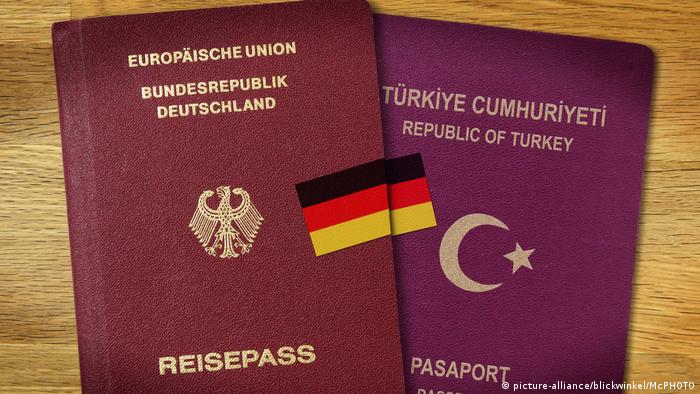By Chase Winter
Exceptions for EU citizens and refugees have led to more naturalized Germans holding two passports in recent years. Some nations prohibit or make it difficult for nationals to give up citizenship when becoming German.
An increasing number of naturalized Germans are not required to renounce their original citizenship before receiving a German passport. The rise has been driven by internal EU migration and an uptick in refugee numbers, according to the Federal Statistics Office.
Of 112,211 naturalized German citizens last year, 68,918, or about 61 percent, kept their previous citizenship, Die Welt newspaper reported on Friday citing the statistics office.
At the turn of the millennium, the share of naturalized Germans with dual citizenship was just under 45 percent. It then grew slightly with fluctuations before a continual increase since 2013.
German law generally discourages dual citizenship, but it does not always require that applicants renounce their citizenship before becoming German. Citizens of other EU member states have the right to dual citizenship inside the bloc. Of those 112,211 naturalized German citizens in 2017, almost 39,000 came from EU member states and 99 percent kept their original nationality.
Another exception is made for refugees, who represent a growing share of dual nationals.
According to Die Welt, in 2017 not a single naturalized German from Iran (2,689), Syria (2,479), Afghanistan (2,400), Morocco (2,390), Tunisia (1,125), Algeria (462), Lebanon (1,294) and Nigeria (954) gave up their original nationality.
For Iraq, another main source of refugees, of the 3,480 nationalized as German in 2017 around 88 percent kept their Iraqi passport.
One reason for the rising rate of dual nationals is that a number of countries where refugees come from do not allow or make it extremely difficult to give up citizenship.
That is the case with countries such as Afghanistan, Syria, Lebanon, Eritrea, Iran, Nigeria, Morocco, Algeria and Tunisia.
Researchers at the European Migration Network, an advisory board to European Commission, estimated that the number of dual nationals will rise significantly in the future following the arrival in Germany of 1.5 million migrants fleeing conflict and poverty in recent years. The increase, however, will not be immediate as there is a six-to-eight-year residency requirement to apply for citizenship.
In addition, the share of dual nationals is also likely to rise in the future through the birth in Germany of children from non-naturalized people seeking protection. A number of countries, including Syria and Iran, consider children born to a male national to also be a citizen, even if they were born outside the country.
Since 2000, the children of two foreign parents can get German nationality as well as that of their parents if at least one parent has legally lived in Germany for eight years.
For many years, the children of such residents in Germany had to decide on their nationality when they turned 23. The government struck down this requirement in 2014.
In all, out of the 73 million Germans living in Germany around 4.3 million people hold at least one other citizenship.
Nationalized Germans with Polish citizenship stand at around 690,000, while there are approximately 570,000 dual German-Russian citizens.




